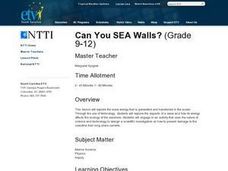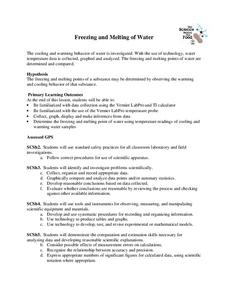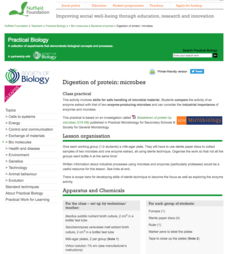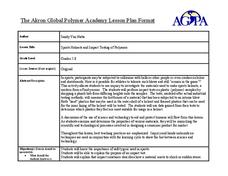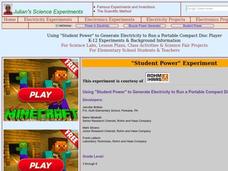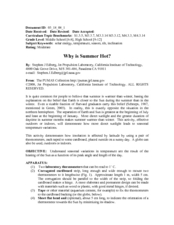Curated OER
Can You SEA Walls?
Students explore how wave energy that is generated and transferred in the ocean. They explore the aspects of a wave and how its energy affects the ecology of the seashore. Students engage in an activity that uses the nature of science...
University of Georgia
Endothermic and Exothermic Reactions
Equip your chemistry class with the tools to properly understand endothermic and exothermic reactions. Young chemists collect, analyze, and graph data to determine how the Law of Conservation of Matter is applied to chemical composition...
University of Georgia
Energy Content of Foods
Why do athletes load up on carbohydrates the evening before a competition? The lesson plan helps answer this question as it relates the type of food to the amount of energy it contains. After a discussion, scholars perform an experiment...
Chymist
How Do We Affect the Quality of Our Atmosphere
Explore the makeup of the earth's atmosphere. Using the set of specific experiments, pupils examine the main elements and compounds present in the atmosphere. Their study extends to investigate the effects of atmospheric pollution such...
Curated OER
Gas Law Investigation
Investigators collect the carbon dioxide produced when an antacid tablet is activated and identify what alteration produced the most gas. They also collect the gas in a buret in order to practice precision. Then they choose between two...
Nuffield Foundation
Measuring Respiratory Quotient
How do scientists prove tiny living things respire? Young scientists build a respirometer and measure respiration rates in living creatures. By comparing the measurements of both plants and animals, they understand the similarities.
Curated OER
Shortened Words
Shorten names and words with different activities. Nicknames, acronyms, and shortened words (fridge instead of refrigerator, for example) are ways for third graders to build their vocabulary and differentiate between formal and informal...
Nuffield Foundation
Measuring the Rate of Metabolism
Plant respiration can be a difficult concept for young biologists to grasp; with a hands-on lab, learners can collect and graph data, then calculate the metabolism rate for the plants they studied. If you do not have a respirometer,...
University of Georgia
Using Freezing-Point Depression to Find Molecular Weight
Explore the mathematical relationship between a solvent and solute. Learners use technology to measure the cooling patterns of a solvent with varying concentrations of solute. Through an analysis of the data, pupils realize that the rate...
Curated OER
BioFuels: The Chemistry and Economics of Alternative Fuels
Junior chemists manufacture biodiesel in the lab. In this exercise, they check the purity of the biodiesel using thin layer chromatography. They also calculate its density and heat of combustion. They are sure to rise to the challenge...
University of Georgia
Freezing and Melting of Water
Examine the behavior of energy as water freezes and melts. An engaging activity provides a hands-on experience to learners. Collaborative groups collect data and analyze the graphs of the temperature of water as it freezes and then...
Nuffield Foundation
Investigating the Effect of Concentration of Blackcurrant Squash on Osmosis in Chipped Potatoes
Model and explore osmosis using squash and potatoes. Young scientists expose chunks of potatoes to different concentrations of a squash solution. They compare the weights of the chunks before and after exposure to the solution and use...
Nuffield Foundation
Investigating Transport Systems in a Flowering Plant
Some weddings have flowers in a unique, unnatural color to match the theme. Young scientists take part in this process to learn about the function of the xylem as they observe colored water moving through a flower. Then, they experiment...
Nuffield Foundation
Digestion of Protein: Microbes
Milk the resource for all it's worth. Young biologists perform assay techniques to test the digestion of protein. They place bacterial samples, fungal samples, trypsin solution, and distilled water on a milk-agar plate to see the effects...
Curated OER
Survival
Students determine the best material from which to make a jacket to keep the body warm in a cold, dry, windy climate. This task assesses the student's abilities to perform an entire investigation.
Curated OER
Investigating Mitosis in Allium Root Tip Squash
Preparing the root tip samples is the most challenging part of the mitosis-viewing lab found here, but the directions help ensure you have everything you need. There is no worksheet included; however, there is a sample data table....
Curated OER
Sports Helmets and Impact Testing of Polymers
Students examine the importance of good quality safety gear. In this investigative lesson plan, students will tests various polymers, collect data, and analyze the data to determine which polymer is best for safety helmets. They will...
Curated OER
Using "Student Power" to Generate Electricity to Run a Portable Compact Disc Player
Students explain the relationship between magnetism and electricity. In this physics activity, students describe the transformation of energy. They create an electromagnet and investigate the factors affecting its strength.
Curated OER
Why is Summer Hot?
Students examine how variations in temperature are due to the Sun and length of day. In this solar lesson students complete a lab activity using thermometers and artificial sunlight to see how the earth is heated.
Curated OER
The Moon Orbits the Sun?!?!
Students calculate the strength of gravitational force exerted on the moon by the sun and earth. In this orbital lesson plan students view a demonstration to see the gravitational forces between bodies.
Curated OER
Molecular Forces at Work: Creating Soap Bubbles
Students investigate adhesion, cohesion and surface tension. In this molecular forces lesson plan, students observe multiple demonstrations that show surface tension, the attraction of water molecules to each other and the ability of...
Curated OER
Sitting on Nails-Boyle's Law
Students experience pressure as a force per unit area in this experiment with a board of nails. In this physics instructional activity, students discover Boyle's law as they perform experiments with pressure.
Curated OER
How Much Energy is Stored in Wood?
In this energy lesson plan, students create calorimeters out of soda cans and use them to calculate the amount of energy stored in different types of wood.
Curated OER
Flame Test
Students conduct a flame test on different substances. In this chemistry lesson, students predict the element present based on the color emitted during the flame test. They explain how different elements produce different colors.
Other popular searches
- Biology Laboratory Apparatus
- Common Laboratory Apparatus
- Crime Laboratory Apparatus
- Physics Laboratory Apparatus
- Laboratory Apparatus Image


